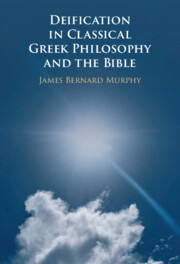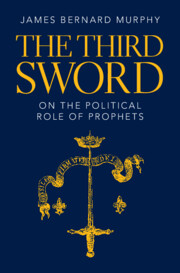32 results

Deification in Classical Greek Philosophy and the Bible
- Coming soon
-
- Expected online publication date:
- June 2024
- Print publication:
- 31 July 2024
-
- Book
- Export citation
Chapter 4 - Joan of Arc
-
- Book:
- The Third Sword
- Published online:
- 23 November 2023
- Print publication:
- 07 December 2023, pp 84-110
-
- Chapter
- Export citation
Contents
-
- Book:
- The Third Sword
- Published online:
- 23 November 2023
- Print publication:
- 07 December 2023, pp vii-viii
-
- Chapter
- Export citation
Acknowledgments
-
- Book:
- The Third Sword
- Published online:
- 23 November 2023
- Print publication:
- 07 December 2023, pp 191-192
-
- Chapter
- Export citation
Chapter 6 - Martin Luther King, Jr.
-
- Book:
- The Third Sword
- Published online:
- 23 November 2023
- Print publication:
- 07 December 2023, pp 140-176
-
- Chapter
- Export citation
Chapter 5 - Thomas More
-
- Book:
- The Third Sword
- Published online:
- 23 November 2023
- Print publication:
- 07 December 2023, pp 111-139
-
- Chapter
- Export citation
Dedication
-
- Book:
- The Third Sword
- Published online:
- 23 November 2023
- Print publication:
- 07 December 2023, pp v-vi
-
- Chapter
- Export citation
Chapter 1 - The Hebrew Prophets
-
- Book:
- The Third Sword
- Published online:
- 23 November 2023
- Print publication:
- 07 December 2023, pp 9-36
-
- Chapter
- Export citation
Index
-
- Book:
- The Third Sword
- Published online:
- 23 November 2023
- Print publication:
- 07 December 2023, pp 193-198
-
- Chapter
- Export citation
Chapter 2 - Socrates
-
- Book:
- The Third Sword
- Published online:
- 23 November 2023
- Print publication:
- 07 December 2023, pp 37-56
-
- Chapter
- Export citation
Conclusion
-
- Book:
- The Third Sword
- Published online:
- 23 November 2023
- Print publication:
- 07 December 2023, pp 177-190
-
- Chapter
- Export citation
Introduction
-
- Book:
- The Third Sword
- Published online:
- 23 November 2023
- Print publication:
- 07 December 2023, pp 1-8
-
- Chapter
- Export citation
Copyright page
-
- Book:
- The Third Sword
- Published online:
- 23 November 2023
- Print publication:
- 07 December 2023, pp iv-iv
-
- Chapter
- Export citation
Chapter 3 - Jesus of Nazareth
-
- Book:
- The Third Sword
- Published online:
- 23 November 2023
- Print publication:
- 07 December 2023, pp 57-83
-
- Chapter
- Export citation

The Third Sword
- On The Political Role of Prophets
-
- Published online:
- 23 November 2023
- Print publication:
- 07 December 2023
Civics Beyond Critics: Character Education in a Liberal Democracy. By Ian MacMullen. Oxford: Oxford University Press, 2015. 275p. $49.95.
-
- Journal:
- Perspectives on Politics / Volume 14 / Issue 2 / June 2016
- Published online by Cambridge University Press:
- 13 June 2016, pp. 555-557
- Print publication:
- June 2016
-
- Article
- Export citation
Environmentalism and Political Theory: Toward an Ecocentric Approach - Robyn Eckersley, Albany, NY: State University of New York Press, 1992, 274 pp. US$44.50 cloth. ISBN 0-7914-1013-7. US$14.95 paper. ISBN 0-7914-1014-5. State University of New York Press, State University Plaza, Albany, NY 12246-0001, USA.
-
- Journal:
- Politics and the Life Sciences / Volume 12 / Issue 2 / August 1993
- Published online by Cambridge University Press:
- 17 May 2016, pp. 281-283
-
- Article
- Export citation
Contributors
-
-
- Book:
- The Cambridge Dictionary of Philosophy
- Published online:
- 05 August 2015
- Print publication:
- 27 April 2015, pp ix-xxx
-
- Chapter
- Export citation
List of contributors
-
-
- Book:
- Behavioral Genetics of the Mouse
- Published online:
- 05 May 2013
- Print publication:
- 25 April 2013, pp ix-xii
-
- Chapter
- Export citation
Rethinking Rights: Historical, Political, and Philosophical Perspectives. Edited with an Introduction by Bruce P. Frohnen and Kenneth L. Grasso. Columbia: University of Missouri Press, 2009. 288p. $44.95 cloth, $24.95 paper.
-
- Journal:
- Perspectives on Politics / Volume 8 / Issue 4 / December 2010
- Published online by Cambridge University Press:
- 23 November 2010, pp. 1191-1192
- Print publication:
- December 2010
-
- Article
- Export citation



